The Malaysian Ministry of Health has confirmed today our first case of a Zika virus infection. A 58-year-old woman from Klang was infected after visiting her daughter in Singapore last month, and complained of rashes and a fever upon returning here. She is the first confirmed Zika case in Malaysia so far, but many of us don’t even know much about the virus in the first place and what its infection entails. We should all take steps to prevent being ridden with the disease, so here’s a rundown of what we know about Zika and how to stay far away from it:
What is Zika? How is it transmitted?

Zika is a viral disease transmitted through Aedes mosquitoes, with the first record of the virus being all the way back in 1947. Besides being carried by mosquitoes, Zika can also be spread through sexual intercourse, or from a pregnant woman to her unborn child.
What are the symptoms of Zika?

Since Zika symptoms are quite small and mild to most, many people won’t even realize that they’re infected, and won’t visit a doctor at all. Its symptoms including fevers, rashes, joint pain, or conjunctivitis (red eyes). Minor symptoms include headaches or muscle pains as well. The signs of Zika might be very similar to a mild case of dengue fever, so make sure to check with a doctor if you’re showing these symptoms.
What are the effects of Zika?

Pregnant women should be extra careful of being infected, as it could lead to serious birth defects in your baby like microcephaly (where the baby’s head will be much smaller than normal), as well as defects in the eye, hearing, and growth rate of the child.
Studies also show that there might be a link between Zika and Guillain-Barré Syndrome (GBS), a rare illness where someone’s immune system will turn against them, damaging nerve cells, causing muscle weakness, even possibly leading to paralysis. Symptoms of GBS include weakness in your muscles, especially in the arms and legs. Even though there is a higher chance of getting GBS after being infected with Zika, very few Zika patients actually get the sickness.
Will Zika affect me in the future?
Zika symptoms typically last for around a week, as the virus sticks around in your bloodstream for that amount of time. According to studies so far, future pregnancies will not be affected if the Zika virus has been cleared from your system.
Can Zika be treated?
So far, there are no vaccines that have been created yet to combat Zika.
How should I prevent getting infected by Zika?

Preventing Zika is simple, and something we’ve been taught all our lives: avoid mosquito bites. Since Zika is transmitted through Aedes mosquitos, be sure to cover up if you’re stepping outside, use Ministry-approved mosquito repellents, keep your doors and windows shut, and clean out your home from items that could breed mosquitoes (i.e. things that hold stagnant water). Your best bet is to just stay indoors and switch on your air-conditioning if risks of infection are high in your area.

Since Zika can also be spread through sex, make sure to use condoms or avoid sexual intercourse completely if your partner has been diagnosed or has recently visited a Zika-infected region. Better safe than sorry!
If you’re planning on travelling to a Zika-infested area, better rethink your plans or reschedule for another time to avoid getting infected yourself. Yes it sucks to cancel travel plans, but you’ll be keeping yourself and your community safer by preventing an outbreak.
Now let’s just hope the recent Zika epidemic will die down soon with no further infections in Malaysia. Make sure to be alert and keep healthy, especially if you’re planning to visit Singapore or other Zika-infected areas in the near future. Let us know of any other mosquito-prevention tips you might have below, and be sure to share this page with your friends and family so they’ll be educated as well. Stay safe everyone!
Featured Image Credit: lifehacker.com
